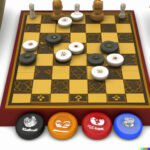Are you a fan of classic board games? Whether you’re a die-hard enthusiast or just looking to dive into the world of timeless favorites, our comprehensive classic board game list has got you covered. From ancient origins to modern play, these games have stood the test of time and continue to captivate players of all ages.
Classic board games have always held a special place in the hearts of game enthusiasts. With their simple yet engaging gameplay, these beloved titles have brought joy and entertainment to countless generations. In this article, we’ll take a closer look at the history, psychology, social aspect, and nostalgia associated with classic board games. We’ll also explore how these games promote strategic thinking and how modern twists keep them fresh and relevant.
Join us as we delve into the world of classic board games and discover why they continue to be cherished by millions around the globe. Whether you’re a seasoned player or just starting out, there’s something undeniably magical about gathering around a table with friends and family to enjoy the timeless appeal of these enduring classics.
History of Classic Board Games
The history of classic board games spans centuries, from their ancient origins to their modern-day popularity. Many of the games we know and love today have roots in civilizations such as ancient Egypt, Mesopotamia, and China. These early versions of board games were often used not only for entertainment but also for religious or educational purposes.
One example of an ancient classic board game is Senet, which was played in ancient Egypt around 3100 BC. This game involved strategy and luck and was often depicted in hieroglyphics and tomb paintings. Another classic board game with ancient roots is Mancala, a game that originated in Africa over a thousand years ago. Mancala has many variations and is still played in different forms today.
As time passed, classic board games continued to evolve and spread across different cultures and regions. The Industrial Revolution brought about new methods of production, making board games more accessible to the general population. In the 20th century, the popularity of classic board games soared, with iconic games such as Monopoly, Scrabble, and Clue gaining widespread appeal.
| Board Game | Estimated Origin |
|---|---|
| Senet | Ancient Egypt (around 3100 BC) |
| Mancala | Africa (over a thousand years ago) |
| Monopoly | United States (1930s) |
Top 10 Classic Board Games
Classic board games have been a staple in households for generations, providing hours of entertainment and bonding opportunities for family and friends. These timeless favorites have stood the test of time, captivating players with their simple yet engaging gameplay. Whether it’s a game that tests your strategy skills or one that relies on luck, there is something for everyone in the classic board game list.
Here are some of the top 10 classic board games that have become a permanent fixture in many homes:
- Monopoly: The game of wheeling and dealing where players buy, sell, and trade properties to corner the market and ultimately bankrupt their opponents
- Scrabble: A word game that challenges players to create words from letter tiles and strategically place them on the game board to earn the most points
- Chess: A game of skill and strategy where two players go head-to-head to capture their opponent’s king while protecting their own
- Clue: A murder mystery game where players must use deductive reasoning to determine the culprit, location, and weapon of a fictional murder
- Risk: A game of global domination where players strategize to conquer territories and outmaneuver their opponents
- The Game of Life: Players navigate through various life stages, making decisions that impact their career, family, and financial success
- Candy Land: A colorful race through a fantastical land filled with sweet surprises, perfect for young children
- Sorry.: An exciting game of sliding and bumping that requires strategy and luck as players race to get all their pawns home
- Checkers: A classic two-player game where opponents aim to capture each other’s pieces by diagonal moves across the board
- Chutes and Ladders: A simple yet entertaining game perfect for young children as they climb ladders and slide down chutes in this counting race
These classic board games have remained popular throughout the years due to their enduring appeal and ability to bring people together in fun and competitive ways. Whether it’s competing for victory or simply enjoying each other’s company, these timeless favorites continue to stand out as some of the best ways to spend quality time with loved ones.
The Psychology of Classic Board Games
Classic board games have stood the test of time, captivating players of all ages with their enduring appeal. But what is it about these classic games that keeps us coming back to them, year after year? The psychology behind the popularity of classic board games offers some fascinating insights into human behavior and preferences.
One reason for the enduring appeal of classic board games lies in the sense of challenge and competition they provide. Games like Chess, Monopoly, and Scrabble require strategic thinking, decision-making, and problem-solving skills. The satisfaction of outsmarting an opponent or achieving victory through cunning tactics can be immensely rewarding, driving players to continue engaging with these games.
Additionally, classic board games offer a sense of familiarity and comfort. Many people have fond memories of playing these games with family and friends, creating a strong emotional attachment to them. This nostalgia factor can evoke feelings of warmth and connection, making it more likely for individuals to revisit these games as a way to relive cherished memories from the past.
Furthermore, classic board games serve as a means of social interaction and bonding. Whether played with family members at home or with friends at gatherings, these games provide opportunities for meaningful connections and shared experiences. The social aspect of playing together adds another layer of enjoyment to the overall gaming experience.
In summary, the psychology behind the enduring popularity of classic board games can be attributed to their ability to provide intellectual challenge, evoke feelings of nostalgia and comfort, and facilitate social interactions. These timeless qualities continue to draw people back to classic board games, ensuring that they remain beloved forms of entertainment for generations to come.
- Chess
- Monopoly
- Scrabble
- Risk
- Clue
How Classic Board Games Bring People Together
Classic board games have long been a popular form of entertainment, not only for their engaging gameplay but also for their ability to bring people together. Whether it’s a family game night or gathering with friends, classic board games create a social environment that encourages interaction and bonding. This section will delve into the various ways in which classic board games foster connections and relationships among players.
Building Social Bonds
One of the most evident reasons why classic board games bring people together is the opportunity for social interaction. As players engage in friendly competition, they are able to communicate, collaborate, and connect with one another on a deeper level. Whether it’s discussing strategy, sharing jokes, or simply enjoying each other’s company, the act of playing classic board games often leads to the formation of strong social bonds.
Promoting Communication Skills
Classic board games also provide an avenue for individuals to hone their communication skills within a group setting. Whether it’s negotiating deals in Monopoly or coordinating moves in Chess, players are constantly communicating with one another to strategize and make decisions. These interactions not only contribute to a fun and engaging gaming experience but also promote effective communication and teamwork among players.
Fostering Friendly Competition
While classic board games may involve competition, they often do so in a lighthearted and friendly manner. The competitive nature of these games encourages healthy rivalry among players while still maintaining an atmosphere of camaraderie. This blend of competition and cooperation fosters a sense of togetherness and creates memorable experiences that keep players coming back for more.
Classic board games have indeed stood the test of time as not only entertaining pastimes but also as facilitators of social interaction and connection. As technology continues to advance, these timeless favorites continue to play an important role in bringing people together through shared experiences and meaningful interactions.
Nostalgia and Classic Board Games
Connecting the Past and Present
One of the unique aspects of classic board games is their ability to transport us back in time to fond memories of our childhood. Whether it’s playing a game of Monopoly with siblings, challenging friends to a game of Scrabble, or strategizing in a game of Risk with family members, these experiences hold a special place in our hearts.
The nostalgia associated with these classic board games creates a sense of connection between the past and present, allowing us to relive cherished moments and share them with new generations.
Emotional Connections
The sentimental value attached to classic board games goes beyond just the gameplay itself. It’s about the emotions and memories tied to these games that make them so enduring. For many, the act of setting up the board, rolling dice, moving pieces, and engaging in friendly competition evokes feelings of warmth, joy, and camaraderie. These emotional connections contribute to why classic board games continue to hold such significance in our lives.
Passing Down Traditions
Classic board games also serve as a means for passing down traditions from one generation to the next. As parents introduce their favorite childhood games to their children, they not only create opportunities for quality time spent together but also impart a piece of their own history.
This passing down of traditions ensures that the love for classic board games remains alive and well, creating a continuous cycle of nostalgia and cherished memories. In this way, these timeless classics become more than just forms of entertainment; they become vessels for preserving family traditions and fostering meaningful connections across generations.
The Art of Strategy in Classic Board Games
Classic board games have a lasting appeal that goes beyond simple entertainment. One of the key elements that make these games timeless is the art of strategy involved in playing them. Games like Chess, Go, and Checkers require players to think several moves ahead, anticipate their opponent’s moves, and adapt their strategies based on the unfolding game dynamics.
The strategic aspect of classic board games not only provides mental stimulation but also teaches important skills such as critical thinking, problem-solving, and planning. Players must carefully consider their options and weigh the potential consequences of each move they make. This timeless appeal has contributed to the enduring popularity of classic board games across generations.
Moreover, these classic board games often have simple rules but complex strategies, making them accessible to players of all ages and skill levels. This accessibility allows for intergenerational play, where grandparents can enjoy these games with their grandchildren, passing down the joy of strategic gameplay from one generation to the next.
Lastly, it’s important to note that classic board games have stood the test of time because they tap into universal themes such as competition, cooperation, and creativity. The art of strategy in these games serves as a common ground for people from different backgrounds and age groups to come together and engage in friendly competition or collaborative problem-solving.
| Classic Board Game | Main Strategy |
|---|---|
| Chess | Protecting the king while trying to capture your opponent’s pieces. |
| Checkers | Moving your pieces strategically to jump over and capture your opponent’s pieces. |
| Go | Territorial control by placing stones on intersections of a game board. |
Reimagining Classic Board Games
In conclusion, classic board games have stood the test of time and continue to be a beloved pastime for people of all ages. From ancient origins to modern play, these timeless favorites have a special place in our hearts and homes. The top 10 classic board games mentioned in this article have proven to be enduringly popular, from Chess and Monopoly to Scrabble and Clue.
The psychology behind why we keep coming back to classic board games is fascinating, with the art of strategy playing a significant role. These games also bring people together, fostering social interaction and creating lasting memories. Nostalgia also plays a part in our love for these games, as many of us fondly reminisce on childhood memories associated with playing them.
Furthermore, the reimagining of classic board games with modern twists helps keep them fresh and relevant. Whether it’s through updated designs, new editions, or digital adaptations, these timeless classics are able to appeal to new generations while still retaining their original charm. The enduring appeal of classic board games is undeniable, making them an essential item for any game night or family gathering.

I love playing all kinds of games – from classics like Monopoly to modern favourites like Ticket to Ride.
I created this blog as a way to share my love of board games with others, and provide information on the latest releases and news in the industry.





